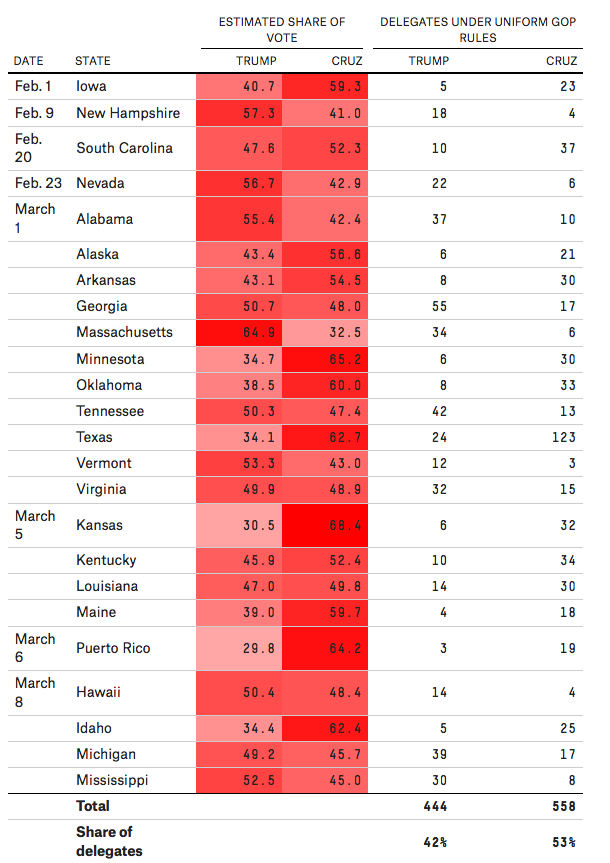
This year’s election cycle has left many voters asking “what if?” What if lower-tier candidates had dropped out sooner? What if the primary had been a one-on-one between Trump and some other candidate? Now, thanks to the brilliant analytics at FiveThirtyEight, Republicans can see a simulation of what their primary would have been like had it been a duel between Donald Trump and Texas Senator Ted Cruz.
At this point, FiveThirtyEight founder Nate Silver acknowledges that Cruz is the only candidate mathematically catching the New York billionaire in the delegate count. After emerging victorious in Idaho on Tuesday and finishing second to Trump in Michigan, Mississippi and Hawaii, Cruz is within striking distance of the GOP front runner.
So far, 29 percent of Republican primary voters have voted for Cruz as compared with 35 percent for Trump. Meanwhile, Cruz trails Trump by 100 delegates: not a trivial gap, although only one more than the 99 at stake in winner-take-all Florida next Tuesday.
The big question is: What would the delegate count look like in a potential two-way race between Trump and Cruz? To find the answer, Silver “retrodicted” how the race might have gone had it been a two-man contest between Cruz and Trump the whole time. He redistributed support from Rubio, Kasich and other candidates to Cruz and Trump based on the exit poll answers provided by voters on hypothetical one-on-one match ups.
Silver’s figures estimate that Cruz would have won South Carolina, Arkansas, Kentucky and Louisiana in addition to the states where he already beat Trump. He also would have won Minnesota and Puerto Rico, which originally went to Rubio. Several other states, such as Michigan, Georgia and Virginia, would have been close between Trump and Cruz. Trump would be fairly dominant in the Northeast, however, and would still have won Nevada easily.
Interestingly, while Cruz would have made many gains in the deep south in this hypothetical, Silver still calculates that Alabama would have been a Trump victory. The vote would have been 55.4 percent to 42.4 percent in favor of Trump, while the delegate split would have been 37 to 10.
In reality, Trump won Alabama by a significant margin and Ted Cruz picked up some delegates. The primary yielded Trump 36 delegates and Ted Cruz with 13.
The second place finish for Cruz was shocking for those following the race long-term. He was predicted for a long period of time to be the favorite in the Yellowhammer State. But Cruz’s southern strategy proved ineffective as front-runner Trump picked up the majority of the delegates available below the Mason-Dixon.
Regardless, the FiveThirtyEight report provides some interesting food for thought. The entirety of Silver’s analysis can be seen below:













